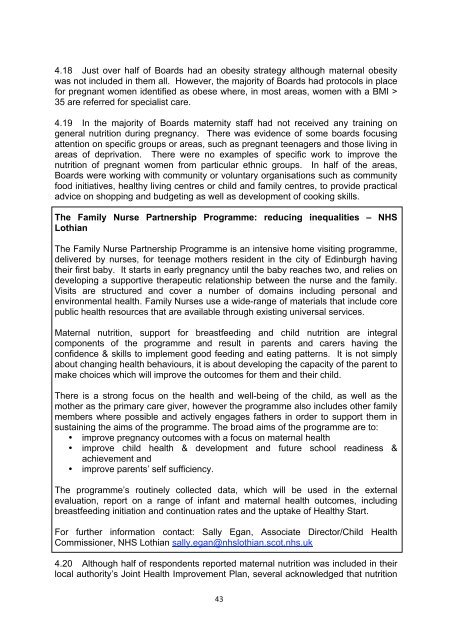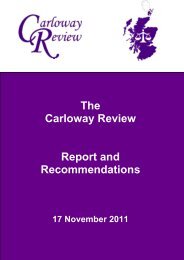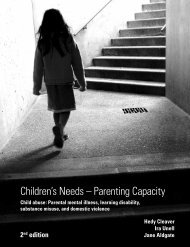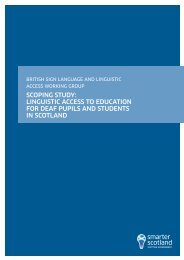Improving Maternal and Infant Nutrition: A Framework for Action
Improving Maternal and Infant Nutrition: A Framework for Action
Improving Maternal and Infant Nutrition: A Framework for Action
You also want an ePaper? Increase the reach of your titles
YUMPU automatically turns print PDFs into web optimized ePapers that Google loves.
4.18 Just over half of Boards had an obesity strategy although maternal obesitywas not included in them all. However, the majority of Boards had protocols in place<strong>for</strong> pregnant women identified as obese where, in most areas, women with a BMI >35 are referred <strong>for</strong> specialist care.4.19 In the majority of Boards maternity staff had not received any training ongeneral nutrition during pregnancy. There was evidence of some boards focusingattention on specific groups or areas, such as pregnant teenagers <strong>and</strong> those living inareas of deprivation. There were no examples of specific work to improve thenutrition of pregnant women from particular ethnic groups. In half of the areas,Boards were working with community or voluntary organisations such as communityfood initiatives, healthy living centres or child <strong>and</strong> family centres, to provide practicaladvice on shopping <strong>and</strong> budgeting as well as development of cooking skills.The Family Nurse Partnership Programme: reducing inequalities – NHSLothianThe Family Nurse Partnership Programme is an intensive home visiting programme,delivered by nurses, <strong>for</strong> teenage mothers resident in the city of Edinburgh havingtheir first baby. It starts in early pregnancy until the baby reaches two, <strong>and</strong> relies ondeveloping a supportive therapeutic relationship between the nurse <strong>and</strong> the family.Visits are structured <strong>and</strong> cover a number of domains including personal <strong>and</strong>environmental health. Family Nurses use a wide-range of materials that include corepublic health resources that are available through existing universal services.<strong>Maternal</strong> nutrition, support <strong>for</strong> breastfeeding <strong>and</strong> child nutrition are integralcomponents of the programme <strong>and</strong> result in parents <strong>and</strong> carers having theconfidence & skills to implement good feeding <strong>and</strong> eating patterns. It is not simplyabout changing health behaviours, it is about developing the capacity of the parent tomake choices which will improve the outcomes <strong>for</strong> them <strong>and</strong> their child.There is a strong focus on the health <strong>and</strong> well-being of the child, as well as themother as the primary care giver, however the programme also includes other familymembers where possible <strong>and</strong> actively engages fathers in order to support them insustaining the aims of the programme. The broad aims of the programme are to:• improve pregnancy outcomes with a focus on maternal health• improve child health & development <strong>and</strong> future school readiness &achievement <strong>and</strong>• improve parents’ self sufficiency.The programme’s routinely collected data, which will be used in the externalevaluation, report on a range of infant <strong>and</strong> maternal health outcomes, includingbreastfeeding initiation <strong>and</strong> continuation rates <strong>and</strong> the uptake of Healthy Start.For further in<strong>for</strong>mation contact: Sally Egan, Associate Director/Child HealthCommissioner, NHS Lothian sally.egan@nhslothian.scot.nhs.uk4.20 Although half of respondents reported maternal nutrition was included in theirlocal authority’s Joint Health Improvement Plan, several acknowledged that nutrition
















